These days, there is a lot of interest in anti-inflammatory diets and anti-inflammatory foods, with good reason.
Many of the foods we routinely eat contribute to chronic inflammation.
And chronic inflammation is linked to diseases such as arthritis, diabetes, cancer, heart disease, and even Alzheimer’s disease.(1)
What is Chronic Inflammation?
Our bodies trigger a process called inflammation to fight infection or illness. Usually short in duration, acute inflammation is a necessary part of the healing process.
However, inflammation can become chronic when low levels of inflammation are continuously present in the body. Chronic inflammation has a significant impact on human health and longevity.
The foods we eat can either contribute to chronic inflammation or help fight it.
Food and Chronic Inflammation
In the simplest terms, an anti-inflammatory diet is made up of two parts: what foods to avoid eating and what to eat.
First, avoid foods that cause chronic inflammation.
Second, eat a diet rich in antioxidants that can help reduce inflammation.
Sounds simple enough, right? But which foods contribute to chronic inflammation? And which foods fight inflammation?
Inflammation-Causing Foods
Highly processed foods containing refined flour, sugar, saturated fats and chemical additives have been shown to directly increase inflammation.
In fact, researchers from Harvard University analyzed data from several large-scale clinical studies to rank foods by their ability to cause chronic inflammation.(2)
They identified the following list as the top inflammation causing foods.
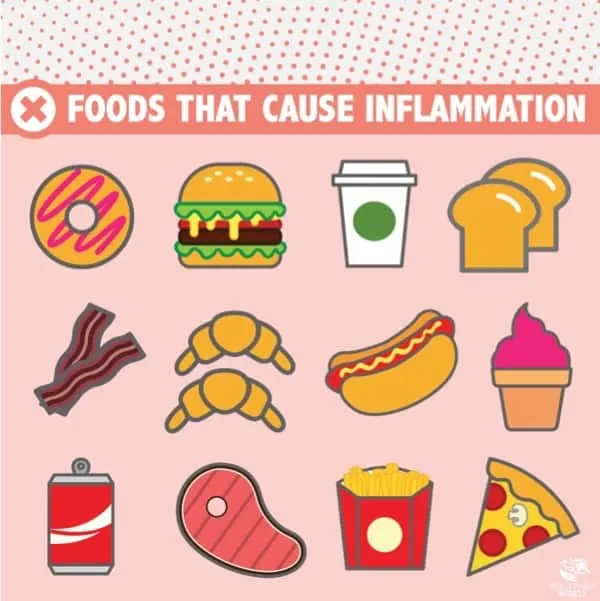
Foods that Contribute to Chronic Inflammation:
- Refined Grains
- Sugar Sweetened Beverages
- Processed Meat
- Red Meat
- Diet Sodas
Unfortunately, many of the convenience foods we enjoy eating are associated with chronic inflammation. Foods with large amounts of sugar and saturated fat are especially inflammatory.
While the exact way these foods contribute to chronic inflammation is unclear, several biological processes are thought to be involved.
Elevated blood levels of triglycerides, byproducts from our gut microbiota, and individual-specific reactions caused by food sensitivities can all cause chronic inflammation.(3, 4, 5)
Does Dairy Cause Inflammation?
There is conflicting information about dairy and whether it causes inflammation.
Dairy is hard to evaluate because it includes many foods ranging from cheese and ice cream (high in saturated fat) to plain yogurt and low-fat milk.
To better understand dairy’s role in chronic inflammation, scientists evaluated the results from 52 clinical studies.(6)
They found a weak association between consuming dairy products and an overall reduction in inflammation.
However, they also found a strong inflammatory response to dairy for those people with a milk allergy or a dairy sensitivity.
How Fats Influence Chronic Inflammation
The fats we eat can also affect levels of chronic inflammation. Trans fats are know to contribute to chronic inflammation.(1, 4)
High levels of saturated fat have also been shown to contribute to low-grade inflammation.
Conversely, monounsaturated and polyunsaturated fats can reduce chronic inflammation.
(Check out this post on Dietary Fat to learn more about healthy fats)
Saturated Fat Contributes to Chronic Inflammation
A recent small clinical study found that eating high levels of saturated fat (found in processed meats, cheese, butter and palm oil) for just two weeks increased blood markers for inflammation.(7)
Also, the study also showed that this high saturated fat diet also caused changes in brain function.
Fortunately, the study also found that replacing saturated fat with a healthier fat, like olive oil, was able to reduce chronic inflammation and improve brain function.
Omega-3 and Omega-6 Fatty Acids and Inflammation
How do omega-6 and omega-3 fatty acids influence low-grade inflammation?
Omega-3 fatty acids, like those found in salmon and other fatty fish, have well documented anti-inflammatory activity.(8)
However, the scientific evidence on whether omega-6 fatty acids are pro- or anti-inflammatory is inconclusive.
Many have implied a high ratio of 6 to 3 may be related to the development of many chronic diseases.
However, the optimal ratio of omega-6 to omega-3 fatty acids remains unknown.(8, 9)
Anti-Inflammatory Foods
A diet of mostly vegetables and fruit with moderate amounts of whole grains, lean proteins, and healthy fats is associated with lower levels of chronic inflammation.(1)
Many of these anti-inflammatory foods are rich in antioxidants, which have been shown to decrease blood markers of chronic inflammation.(10)
To understand which fruits and vegetables are the most anti-inflammatory, scientists ranked more than 60 different fruits and vegetables based on their antioxidant capacity.(11)
The vegetables that consistently scored as the highest antioxidant capacity are listed below.
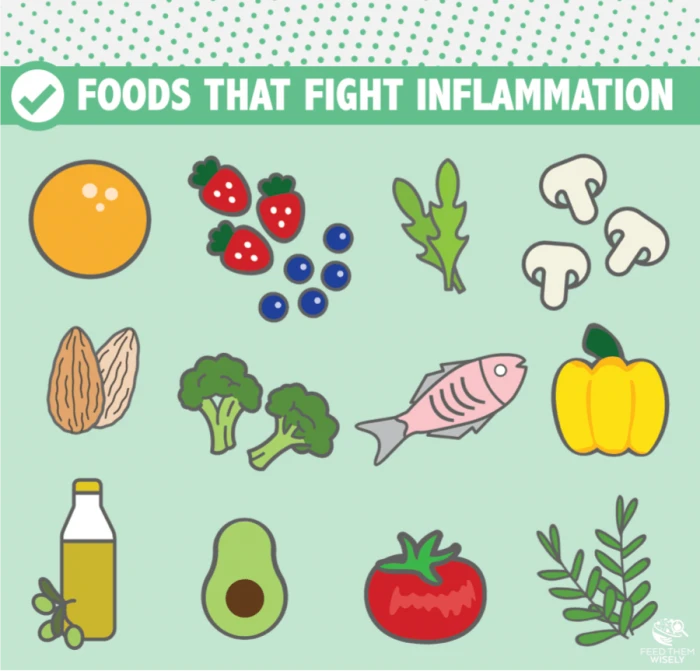
Most Anti-Inflammatory Vegetables:
- Spinach
- Chili Peppers
- Red Bell Peppers
- Mushrooms
- Arugula
- Turnip Tops
- Beets
- Broccoli
- Swiss Chard
- Asparagus
Vegetables with the most anti-inflammatory power tend to be very colorful.
If you are looking to fight chronic inflammation, make sure you eat a variety of dark green and brightly colored vegetables.
Brightly colored fruits and berries are also excellent sources of antioxidants with powerful anti-inflammatory activity.
Most Anti-Inflammatory Fruits:
- Blackberries
- Strawberries
- Raspberries
- Blueberries
- Red Currents
- Olives
- Pineapple
- Oranges
Blackberries were, by far, the best performing antioxidant fruit tested.
However, all berries are excellent sources of antioxidants, especially wild berries.
Many herbs and spices are also great sources of antioxidants.
Several researchers have measured the antioxidant capacity of several common culinary spices.(12, 13) Below is a list of the top anti-inflammatory spices.
Top Anti-Inflammatory Herbs & Spices:
- Rosemary
- Oregano
- Basil
- Turmeric
- Cumin
- Thyme
- Cinnamon
- Black Pepper
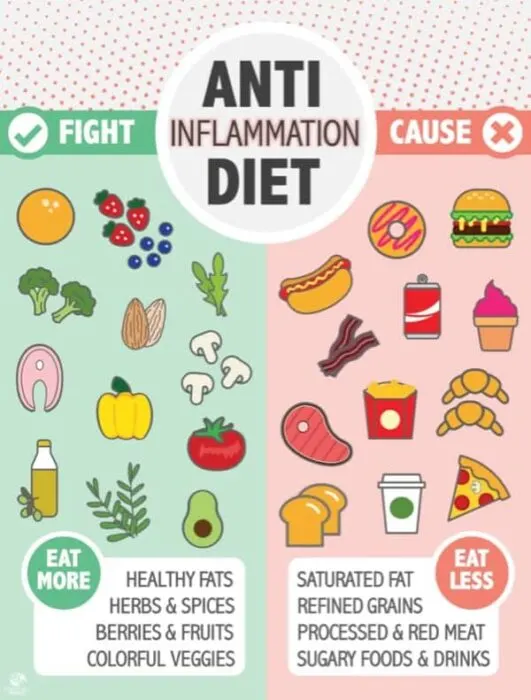
Anti-Inflammation Diets
While there isn’t one set anti-inflammatory diet, the foundations of anti-inflammation diets are the same:
- Avoid foods that contribute to low levels of chronic inflammation
- Eat whole, unprocessed foods that contain healthy fats and antioxidants to help reduce chronic inflammation
The best anti-inflammatory diet contains predominantly antioxidant rich veggies and fruits with some whole grains, lean protein, nuts and healthy fats.
Healthy anti-inflammatory diets should also include fresh herbs and spices.
Herbs and spices not only add delicious flavor to meals, they are also great sources of antioxidants and other bioactive compounds that help reduce inflammation.
These popular diets can be considered anti-inflammatory:
- Mediterranean Diet
- Whole Food, Plant-Based Diet
Anti-inflammatory Mediterranean-style diet
A Mediterranean-style diet is rich in whole grains, fruits, vegetables, legumes, nuts, fatty fish, and healthy oils.
Eating a Mediterranean diet has been clinically shown to reduce low-grade chronic inflammation.
Specifically, randomized clinical trial of almost 200 people with metabolic syndrome showed that people eating the Mediterranean diet had a significant reduction of chronic inflammation markers compared with people on a standard healthy diet.(14)
Anti-inflammatory Whole Food, Plant-Based diet
A Whole Food, Plant-Based diet (WFPB) is essentially a minimally processed vegan diet.
A WFPB diet is rich in whole grains, fruits, vegetables, legumes, nuts and avoids animal-based foods like dairy, eggs and meat.
A recent clinical study found that eating a vegan diet can significantly reduce chronic inflammation.
Specifically, a randomized clinical trial of 100 people with coronary artery disease found that people eating a vegan diet had a significant reduction of chronic inflammation markers compared with participants on the American Heart Association’s recommended diet.(15)
Using Food to Reduce Chronic Inflammation
Dietary changes can significantly reduce low-grade chronic inflammation.
To get started, first reduce the amount of processed foods in your meals, especially those containing excessive amounts of sugar and saturated fat.
Next, transition to a diet made up of minimally processed vegetables, fruits, whole grains, legumes and healthy fats.
If this sounds daunting, start by changing one meal a week. Small changes, over time can add up to noticeable health improvements.
Pin article for later:
References:
- Foods that fight inflammation, Harvard Health Publishing Website (link)
- Development and Validation of an Empirical Dietary Inflammation Index. The Journal of Nutrition, Volume 146, Issue 8, August 2016 (link)
- What to Eat When. Michael F. Roizen and Michael Crupain. 2019 (link)
- Fighting Inflammation at the Meal Table, Harvard Health Publishing Website (link)
- The Anti-Inflammation Diet & Action Plans. Dorothy Calimeris and Sondi Bruner (link)
- Dairy products and inflammation: A review of the clinical evidence. Critical Reviews of Food Science and Nutrition, Volume 57, Issue 12, 2017 (link)
- Dietary saturated fat and monounsaturated fat have reversible effects on brain function and the secretion of pro-inflammatory cytokines in young women. Metabolism, Volume 65, Issue 10, October 2016 (link)
- Anti-Inflammatory Affects of Omega 3 and Omega 6 Polyunsaturated Fatty Acids in Cardiovascular Disease and Metabolic Syndrome. Critical Reviews of Food Science and Nutrition, Volume 57, Issue 16, 2016 (link)
- Omega-3 Fatty Acids, Fact Sheet for Health Professionals, NIH Website (link)
- Total antioxidant capacity of the diet is inversely and independently related to plasma concentration of high-sensitivity C-reactive protein in adult Italian subjects. British Journal of Nutrition, Volume 93, Issue 5, March 2007 (link)
- Total Antioxidant Capacity of Plant Foods, Beverages, and Oils Consumed in Italy Assessed by Three Different In Vitro Assays. The Journal of Nutrition, Volume 133, Issue 9, September 2003 (link)
- Prebiotic Potential and Chemical Composition of Seven Culinary Spice Extracts. Journal of Food Science, Volume 82, Issue 8, August 2017 (link)
- Antioxidant Activities of Hot Water Extracts from Various Spices. International Journal of Molecular Sciences, Volume 12, Issue 6, June 2011 (link)
- Effect of a Mediterranean-Style Diet on Endothelial Dysfunction and Markers of Vascular Inflammation in the Metabolic Syndrome. Journal of the American Medical Association, Volume 292, Issue 12, Sept 2004 (link)
- Anti-Inflammatory Effects of a Vegan Diet Versus the American Heart Association–Recommended Diet in Coronary Artery Disease Trial. Journal of the American Heart Association, Volume 7, Issue 12, Month 2018 (link)
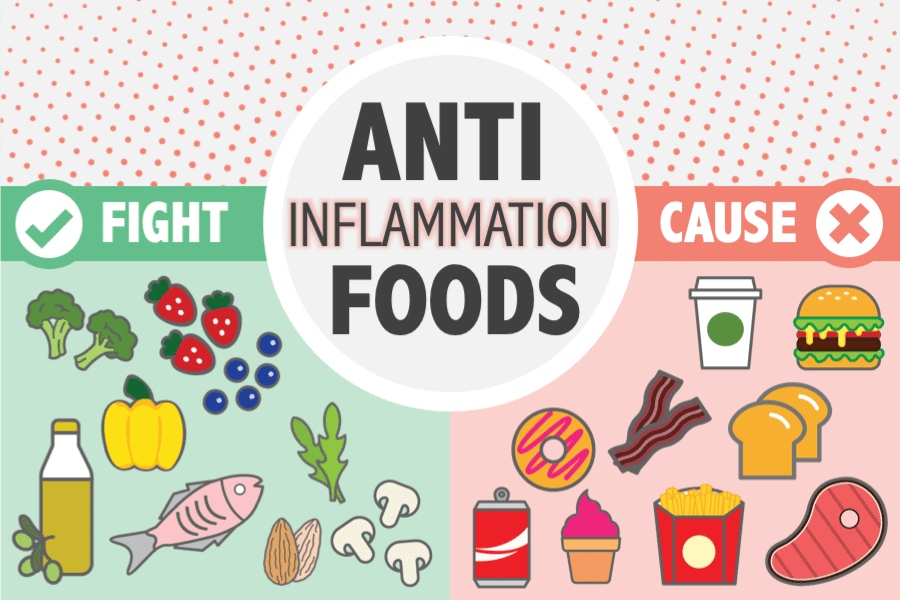
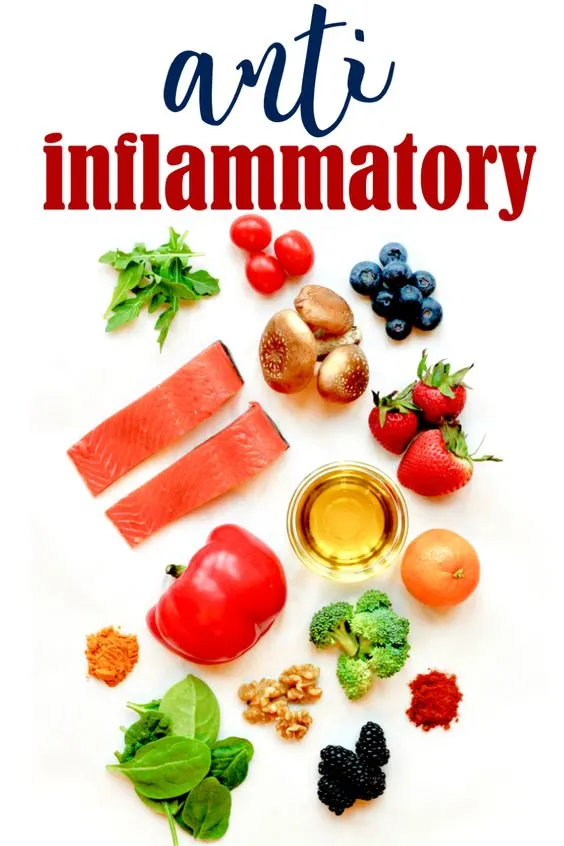
Nancy
Friday 8th of July 2022
I like most of the foods you have listed I should eat but they are usually accompanied by most of the foods you say I should not eat this will be a challenge I need new recipes thank you for your research search you have saved me a lot of time
Marylyn C.Farla
Tuesday 23rd of February 2021
Thanks for helping me to decide for a more anti-inflammatory foods.
Mimi
Tuesday 28th of May 2019
Thank you so much for this overview. It is amazing how much there is always to learn. So much useful information!
STACEY CRAWFORD
Monday 27th of May 2019
Thank you for this very useful resource and a handy list of anti-inflammatory foods. Great article & research. Sharing :)
Meredith
Tuesday 28th of May 2019
You're very welcome Stacey! Thank you for sharing!!!
chihyu
Saturday 25th of May 2019
Interesting article. I learned a lot. thank you!